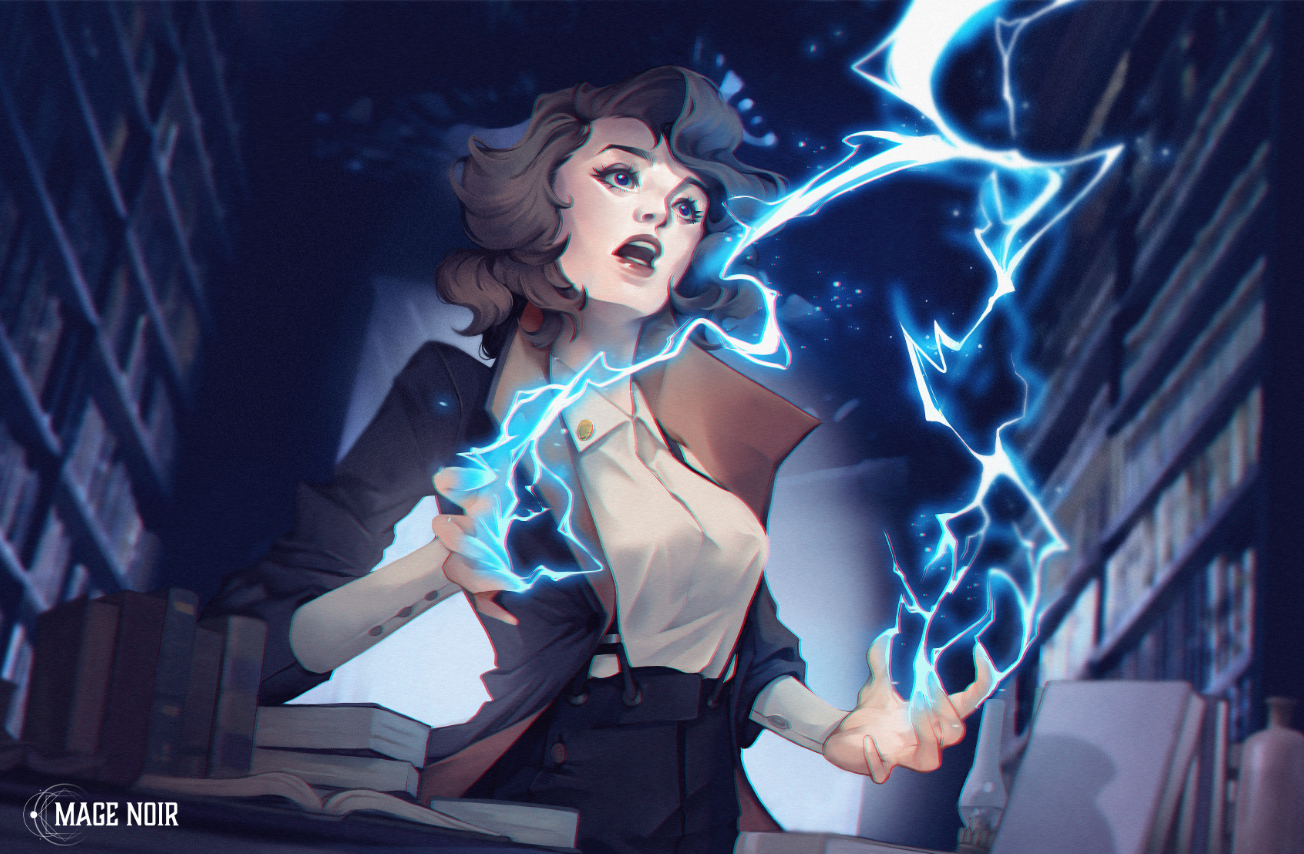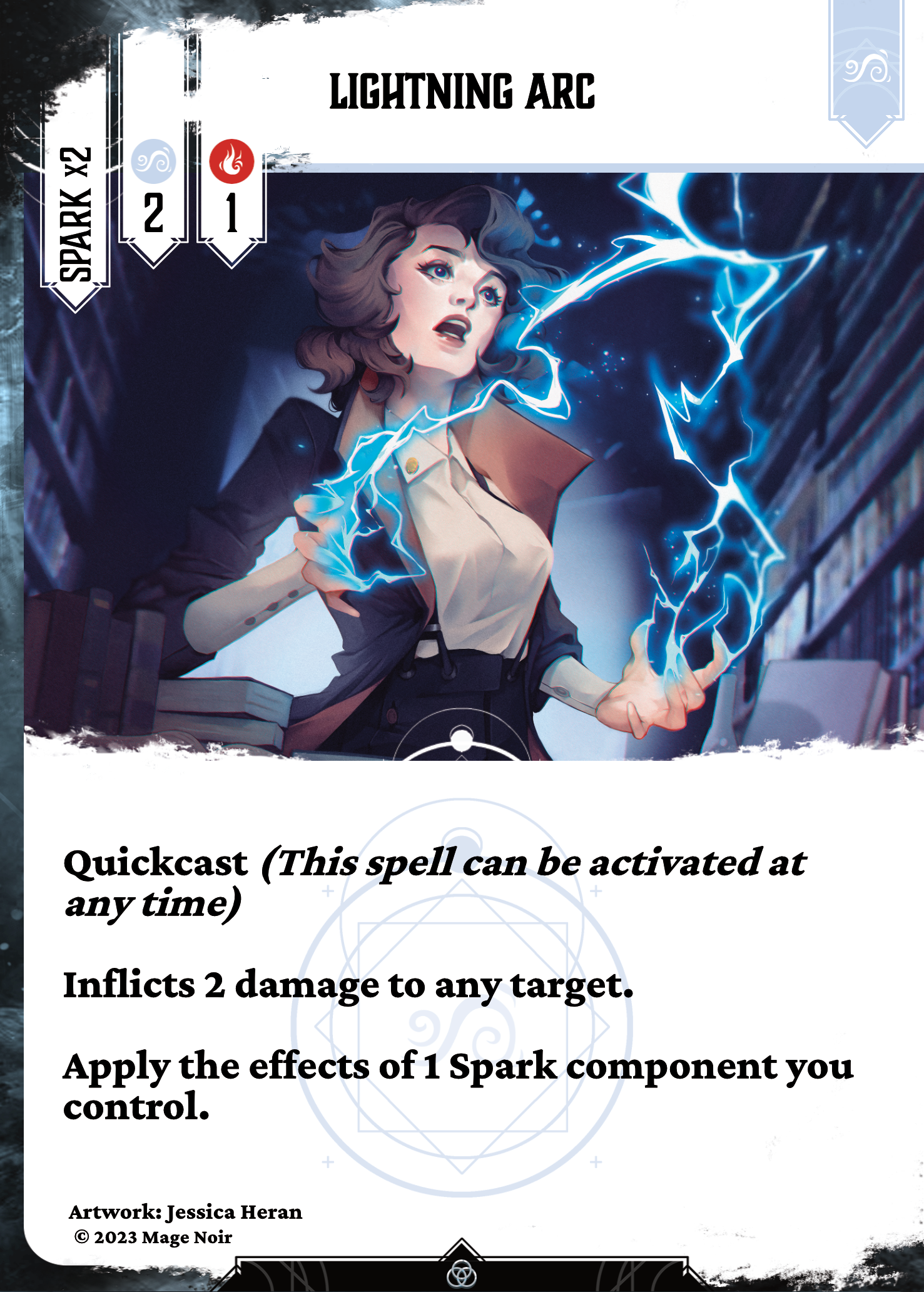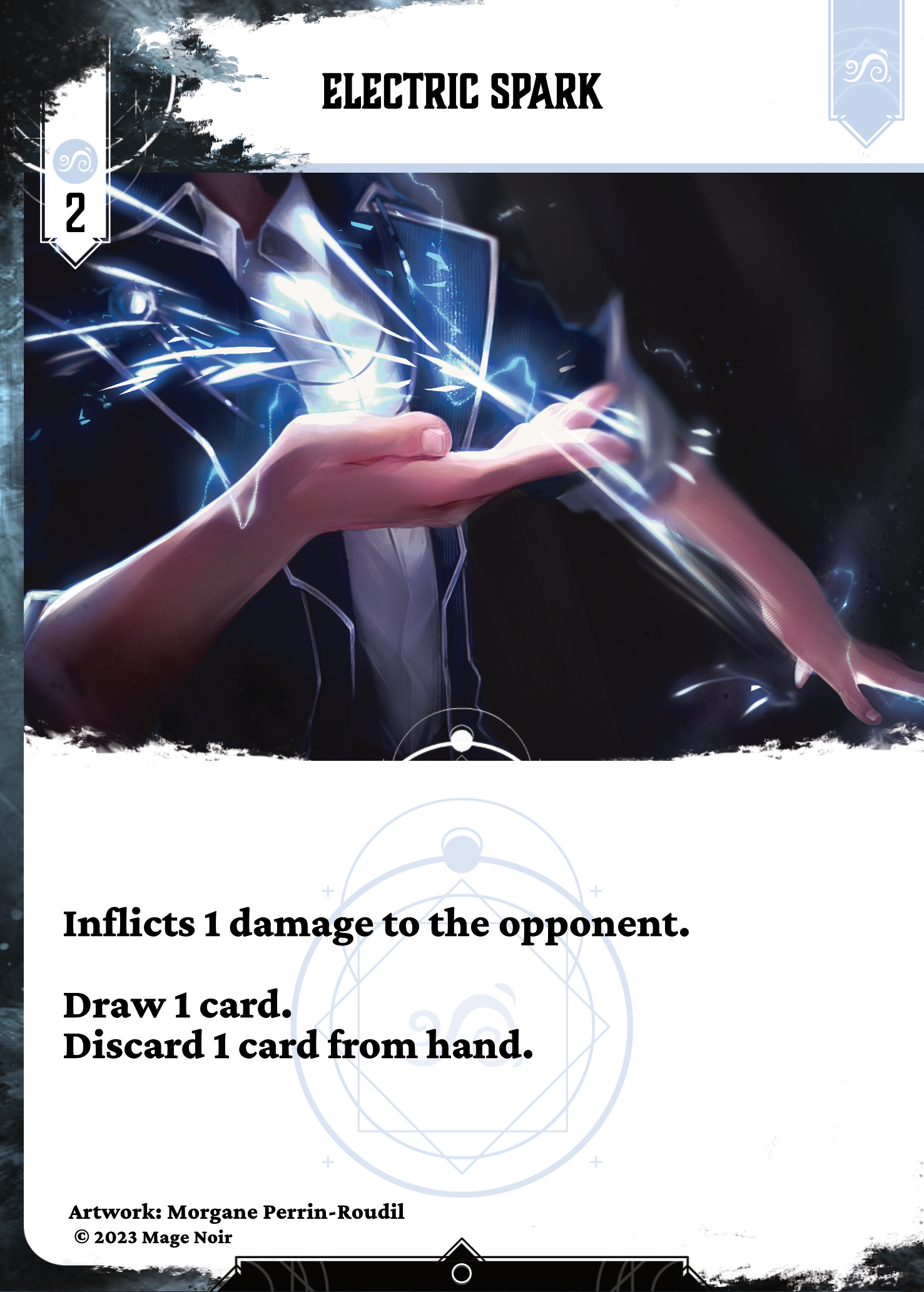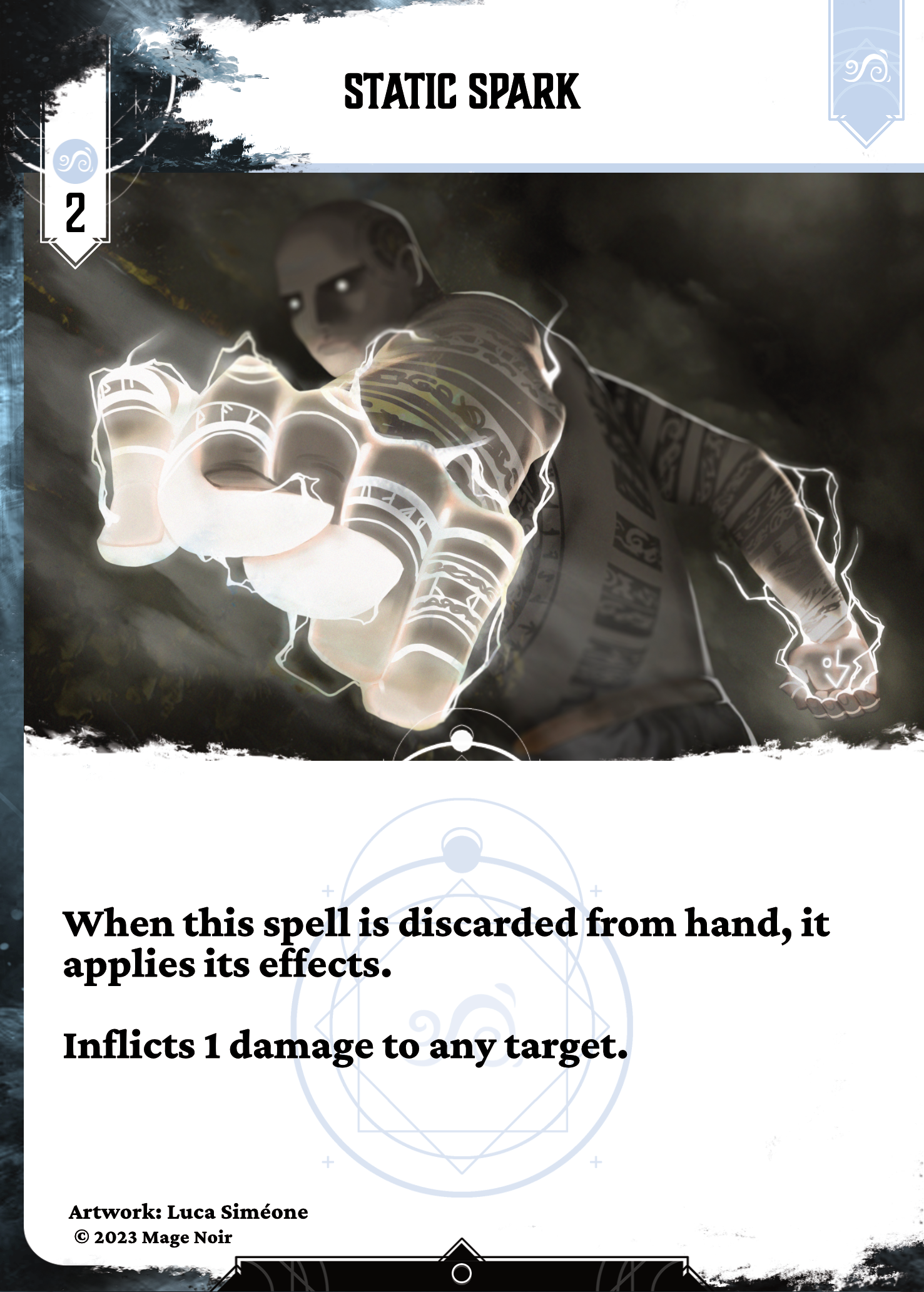Designing the electrique expansion, December 13, 2023
Hi there Mages!
A while ago, we did 6 blog posts about the different elements of the game. The neat part about these is that they had multiple practical uses.
- They gave you insightful information on our philosophy concerning the game’s design.
- They taught you about the elements themselves and how they function.
- They gave us a canvas where we could put our ideas, sort them, and keep them neatly gathered. Ready to be re-read if need be.
We really like writing these design blog posts and we think it is time to go for round two, especially with the new expansions coming soon.
So let’s go for it. And just like last time, let’s start with the fastest of the bunch, the impatient blaster. Let’s talk about electricity.

Arc de foudre par Jessica Heran
Why go for electricity?
Unlike the base elements which emerged from a fully blank canvas, these expansions came from a pre-existing basis, with strong fun points, but also parts that could be made even more interesting when enhanced by the right concept.
While Air and all of its windy playstyle is great at gathering new cards and rewarding clever use of combos, it was also not that easy to grasp for newer players.
Rather, it was easy to use, but required a good knowledge of the intricacies of Mage Noir to deploy its full potential. Which is great for veterans, but not as great for newer players.
We wanted to come back to our first gut feeling about Air, with a deck that is still as combo heavy, but easier to understand from the get go.
Electricity was a perfect fit for multiple reasons:
- It fits the Air flavor and functions very well.
- It is an aggressive element that focuses on dealing damage, thus easy to grasp for newer players.
- The concept of conductivity and making electric chains is perfectly fitting for a combo playstyle.
- With electricity already considered as something that is quick in real life, it would fit the Quickcast keyword perfectly.
Thus, we picked electricity for the Air expansion. (And it was definitely not because Khnil wanted to cast lightning bolts while laughing like a maniac.)
So what is Electricity about?
Electricity revolves around 3 key concepts:
- Chaining spells
- Stunning the opponent
- Being quick
Electricity also has this interesting dichotomy between natural lightning bolts and channeled electricity.
Lightning bolts are loud, powerful and flashy, but they use a lot of energy and are hard to master. Channeled or “domesticated” electricity however is easier to handle and a bit tamer compared to its natural counterpart.
The duality of electricity as a part of the Lore
Just like in any group, the Mages of the Circle don’t always agree with each other. Some more old-school electric Mages view thunder and lightning as a force of nature that should remain wild and unshackled to reveal its true potential. A flamboyant individual, highly proficient at unleashing thunder and unafraid to display it, fiercely defends this idea. In fact, one of his most spectacular displays of power caught the attention of non-Mages on Mount Olympus a long time ago. These Mages are often depicted in flashy spells like Zeus’s thunder or Raijin’s roar.
Other Mages seek ways to harness this raw power efficiently. Using conduits, machines, and other ingenious ideas, they aim to master electricity and make it accessible for everyone, including non-Mages. One of the most brilliant Mages pursuing this ideal is the globally renowned Nikola Tesla. This branch of electric magic is more tied to technical spells with lots of utility like Tesla coil, flash inspiration or Static boots.
This dichotomy has led to conflicts among electricity users, but since the latter group could channel the former’s spells to power their inventions, things eventually resolved in favor of a “domesticated” approach. Natural electricity users still harbor some resentment, but they have begrudgingly admitted their defeat.
What we did with electricity
Concerning chaining spells, going back on what we did with Air already helped us pick a playstyle. Tornado applying the effects of one of its components was fun to play with. Building on that, electricity features quite a few spells applying their own component’s effects.

We also wanted some different ways to handle chain effects. This gave birth to some interesting cards like Chain lightning (chaining with itself) or Wave of lightning (using water as a conductive support for the chain itself). It all seemed very thematic, as well as very fun to use. So we went for it!
Stuns on the other hand, was a bit trickier to fit into the playstyle. We didn’t want electricity to step on ice’s field too much (more on that in the future blog post about the Glace expansion), but we still wanted it to have some clear moments of hindering your opponent’s tempo.
This is why spells like “Zeus’s thunder” initially had very direct and restrictive effects for your opponent.
It was initially meant to block all of your opponent’s draws during a whole turn. It was interesting but learning from other game’s experiences, we knew that absolute draw prevention could lead to strong blocking strategies that were too frustrating to play against. We thus opted for a softer draw reduction (only preventing card gain outside of the draw phase) but made it wider. It now prevents any effects that would make the opponent get more cards in hand, including bounces, fetches, draws, etc.
Implementing quickness was a relatively straightforward process. We had long envisioned introducing a mechanic that would enable you to play during your opponent’s turn as a reaction. The ‘At any time effects’ from the base game already served this purpose, providing the foundation for the Quickcast keyword. Given that electric spells were designed for use during your opponent’s turn and we had a clear concept for Quickcast, it felt only natural to associate the two.
We now had to look at the expansion’s components to make sure they fit the playstyle.
Igniting the spark
Sparks were meant to be small yet aggressive spells right from the get go. Since we knew electric spells could activate the effects of their components, their effect would probably trigger multiple times during games.
This means spark components would actually become a great strength of the electric playstyle.
- They would stay on the board
- They would act as component
- Yet they would still apply their effects.
To make up for this strong part of their identity, we made sure their cost was high compared to their output.


This was also reflected in the general cost of electric spells. If you compare their raw cost/power ratio to other spells such as winds or other fire spells, they usually seem pretty underwhelming. It is only with the right setup and components in place that they will truly shine.
Which brings us to the following point.
Electricity’s thematic feel reflects its main weakness
The main drawback of the electric playstyle is that it requires setup. The element’s quite high component requirements as well as high mana costs to get spells that are quite underwhelming by themselves requires several things from the player to become successful:
- Rather favorable draws,
- A threat potential that is theoretically more sided towards late game,
- And relatively high Mana costs in early game compared to the spells outputs.
This drawback comes with a very thematic and natural feel.
When a storm is gathering, you can feel it in the Air. The atmosphere is thick, the clouds darken, you know it’s coming, you simply don’t know when.
This is exactly what’s going on with this expansion playstyle. You’re gathering your stormy clouds, filling the air with tension, and waiting for the right moment to strike in a loud bang. Unleash the power of lightning on your already apprehensive opponent and leave them in shock.
See you next time mages!
We hope this window of our thought made you excited for the Electrique expansion. We’ll be back for more in a few days to talk about the next expansion.
Until then, take care of yourselves Mages, and have fun!
~ Everyone at Double Combo Games